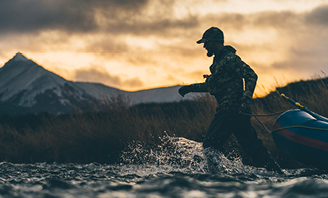Coming at you LIVE from Shot Show. Leupold CEO Bruce Pettet welcomes Tim Kennedy to the Leupold family and what it means to Be Relentless. Tim is an active, Ranger qualified, Green Beret, Special Forces Sniper with tours in Iraq and Afghanistan, as well as other locations around the globe. He’s also a retired MMA fighter who competed in the UFC, Strikforce, WEC, ShoMMA, and HDNet Fights.
In this podcast, Tim recounts his first Ruger 10/22, which had a Leupold rifle scope on it. He used this .22 to hunt squirrels until the age of 10.
Tim’s reliance on Leupold scopes continued. His first big game hunting rifle had a Leupold scope on it. The first time he went to sniper school, he used a Leupold rifle scope. The first time he deployed, he was armed with a rifle using a Leupold scope. And, of course, the first time he was in an intense gun fight, Tim Kennedy relied on a Leupold.
Bruce connects Tim’s unique skillsets to the uniquely American company culture of Leupold Optics. Over 70-years of riflescope making has been engineered and developed in its Beaverton, Oregon factory, with a number of employees having over 40 years of experience with the company.
While Leupold works to create epic moments for families and friends on the hunt, some of the best moments come from our war fighters who used its optics in the field. These moments inspire the team to make scopes that won’t let them down.
Tim recalls more experiences with the brand - being one of the first guys to be able to use the Horus reticle in a “really good” scope provided by Leupold. That scope went to Iraq and Afghanistan and did real work.
Tim Kennedy also digs into his current television work, which includes the History Channel’s “Hunting Hitler,” an A&E show where he runs the Army Sniper Competition as a competitor and as a host, and his new Discovery Channel show called “Hard to Kill.”
Through it all, Tim still comes back to hunting in order to ground himself and spiritually heal – staying connected to nature, knowing where his food comes from, and understanding the conservation efforts hunters engage in to protect the animals they harvest.



